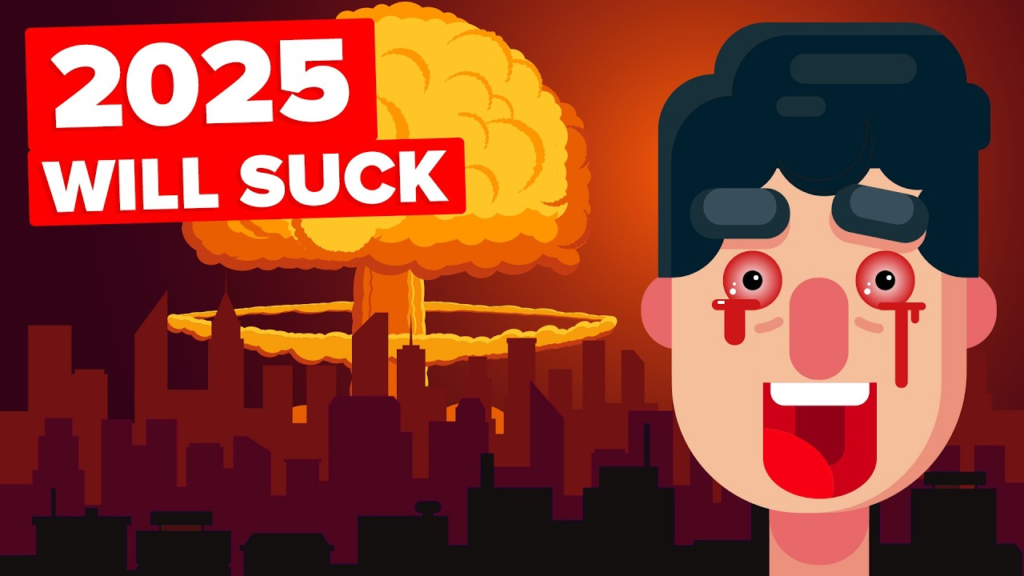The internet is buzzing with a new conspiracy theory known as the “Year of Doom”, which compares the upcoming year 2025 to the historically significant and tragic year of 1941. This comparison, which has gone viral on social media platforms like X (formerly Twitter), TikTok, and Reddit, suggests that 2025 is headed for major global conflict or disaster similar to World War II.
However, experts across fields including history, psychology, and international affairs have come forward to debunk this theory, calling it a product of fear-driven pattern recognition and misinformation.
What Is the “Year of Doom” Theory?
The theory claims that signs around the world—such as rising political tensions, war in Ukraine, economic instability, and climate crisis—mirror the global climate leading up to 1941. That year, the United States entered World War II following the attack on Pearl Harbor, marking a turning point in modern history.

Supporters of the theory point out that:
- Economic challenges today resemble those before the 1940s
- Nations are increasingly divided politically and socially
- Technology and media are amplifying conflict
They argue these similarities are not coincidental, but warnings that 2025 will be a year of catastrophe—ranging from war to economic collapse or a global disaster.
Why Experts Say the Theory Is False
Leading scholars and scientists have repeatedly dismissed these claims. According to Dr. Rachel Klein, a professor of modern history at the University of California, “This theory is an example of historical cherry-picking. People are selecting facts that seem similar and ignoring the differences.”
Psychologists say this type of thinking is part of apophenia, the tendency to perceive patterns where none exist. It’s also linked to confirmation bias, where people seek out evidence that supports their fears and beliefs.
“There’s no scientific or historical basis to suggest that years repeat themselves in cycles,” said Dr. Mark Evans, a behavioral psychologist. “What we’re seeing is the human brain trying to make sense of chaos by finding familiar shapes in it—like seeing animals in clouds.”
The Role of Social Media in Amplifying Fear
Social media platforms play a massive role in spreading this narrative. Viral videos, threads, and memes are being shared under hashtags like #YearOfDoom2025 and #HistoryRepeats. Some of these videos include dramatic music, photos of past wars, and fast-cut visuals of current global events, heightening the emotional impact.
Algorithms also favor emotionally charged content, meaning more people are seeing and engaging with posts that push fear and conspiracy.

Media experts warn that this echo chamber effect can make misinformation feel real. “When you see hundreds of people talking about something, your brain starts to believe it’s valid—even if it’s not,” said Laura Chen, a media literacy researcher.
Real Global Issues vs. Exaggerated Fear
Experts acknowledge that the world is facing serious problems:
- Climate change is accelerating
- Conflicts in Ukraine, Gaza, and elsewhere are unresolved
- Democracies are under strain in several nations
- Economic inequality is growing
But these do not indicate a guaranteed global collapse or war in 2025. “We must differentiate between awareness and alarmism,” says Dr. Fiona Wright, an international policy analyst. “Yes, the world is going through challenges, but history is not doomed to repeat itself. Humans have more tools today—diplomacy, technology, and education—to prevent such disasters.”
How to Spot and Avoid Fear-Based Narratives
- Check the source: Make sure the information comes from reputable news outlets or verified experts.
- Look for emotional language: Posts using fear-based words like “doom,” “collapse,” or “end times” often aim to go viral, not inform.
- Compare different viewpoints: Seek out articles and opinions from multiple sources.
- Avoid echo chambers: Social media algorithms tend to show you content you already agree with. Challenge yourself to explore other perspectives.
What You Can Do Instead

Rather than panic over doomsday theories, experts recommend focusing on real ways to stay informed and empowered:
- Follow updates from trusted organizations like the United Nations, World Bank, or Pew Research Center
- Learn how to combat misinformation from resources like Media Literacy Now
- Take part in community or civic activities to create positive change locally
Conclusion: Fear Sells, but Facts Matter More
The “Year of Doom” theory comparing 2025 to 1941 may be spreading quickly online, but it has little grounding in reality. Experts across fields agree: while we must be cautious and alert in today’s complex world, fear-based comparisons to past tragedies are misleading and unhelpful.
As we approach 2025, instead of surrendering to panic or viral misinformation, it’s far more productive to focus on building resilience, staying informed, and demanding responsible reporting.
Let’s leave the fear to fiction and face the future with reason, not rumor.
Also Read – Vienna Dethroned—Which City Now Tops Liveability List?






